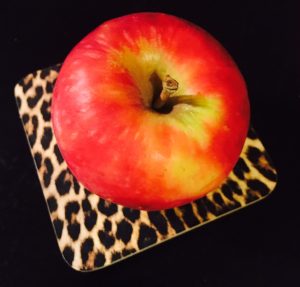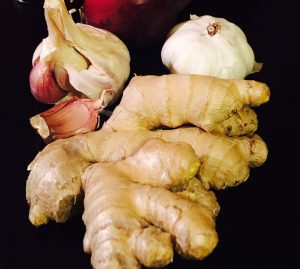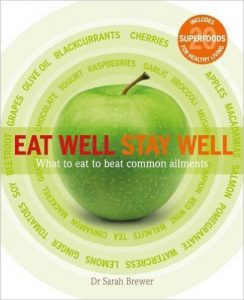If you have a tendency to reach for a heavy bowl of carbs and dive under your duvet on these cold, dark evenings, it’s time to break the cycle! I spoke to Dr Sarah Brewer, medical doctor, author, registered nutritionist and nutritional therapist to find out her go-to foods to stay fit and healthy during the winter months.

You might not have realised it, but by bolstering your diet with fresh fruit, veggies and vitamins, you can reduce your risk of picking up colds and flu and ease dreaded symptoms if you do fall ill. “Garlic, leeks and onions are full of antiviral and antibacterial properties and when it comes to fruit, look no further than a juicy and refreshing apple. This fruit contains soluble fibre and antioxidant flavonoids that activate immune cells and reduce inflammation,” says Dr Brewer.

Seasonal eats
One easy way to make a change next time you’re doing your weekly trolley dash is to look for what’s in season. “Winter root vegetables are great at this time of year and I love a stew made with meat stock, vegetables and some crème fraiche stirred in at the end,” says Dr Brewer. She suggests picking up carrots, parsnip, turnip, swede, kohl rabi, celeriac and members of the onion family such as leeks. I find that my default choices at the supermarket are peppers, carrots or mushrooms, so it’s really nice to open myself up to more veg options and it’s a chance to try out new recipes too!

The dreaded snack attack
The 11am and 3pm slump can be really hard to get through when it comes to resisting chocolate or the bright lights of the vending machine. The short solution to this dilemma is try not to give in every time! The sugar rush that you’re so badly craving will wear off and you’ll have eaten up empty calories. Replacing high or refined sugar treats is an easy win and it will even help you to fight off colds and flu if you eat cleverly. If you need a quick snack at work or out and about, have a handful of Brazil nuts suggests Dr Brewer, “Selenium is needed to make antibodies to stimulate natural killer cells that fight infections. Influenza symptoms are more severe in people with a selenium deficiency and the richest dietary source are Brazil nuts.”
The box set black hole
There’s nothing better than settling in to watch your favourite television series and devouring a pizza or a delicious take-away but if this becomes a regular occurrence in winter, it can have a serious effect on your health…not to mention waistline! “We have a natural hibernation response that is enhanced by eating carbohydrates,” Dr Brewer explains. “Don’t go for big helpings of bread, pasta or rice to warm-up. Opt for home-made soups, stews and casseroles that are brimming with a rich variety of vegetables.” I’m the first person to hold my hand up and say it that it can be hard to resist the couch and to cook a meal from scratch after a busy day and a long commute but home cooking is not only healthier, it’s cheaper too. Cooking on a Sunday when you have more down time means that you can make delicious options to go in your freezer for those nights you can’t quite muster your inner MasterChef winner.

Lack of sunlight means that our vitamin D levels can take a bit of a hit between now and the New Year. Fish liver oils, animal liver, fortified margarine, eggs, butter, fortified milk and supplements are all great sources of vitamin D, encourages Dr Brewer. “Amongst elite athletes, those with optimal blood vitamin D levels were 70% less likely to have time off work and training due to upper respiratory tract infections. If you think your diet is not as good as it should be, a sensible A-Z type multivitamin is a good idea. Research involving 130 volunteers found only 43% of those taking a multivitamin and mineral supplement reported infectious illness over the year, compared with 73% taking inactive placebo. A daily probiotic supplement or drink primes immunity,” says Dr Brewer.
Add a touch of spice
Home-made curries can be a great choice for a family meal or to take as leftovers for lunch in work during the week. “The spices in curries have antioxidant and immunity-boosting properties,” Dr Brewer explains. “Add coconut milk and you have a great, warming, filling and healthy dish. Brown rice is a good option rather than white rice as it has more fibre, B vitamins and minerals such as magnesium.” We all have a go-to meal when we’re tired or in need of a nutritional recharge. For Dr Brewer, her choice is easy, “My home-made chilli with lots of coriander leaves, coriander seed, cumin, ginger, dark chocolate and the antioxidant kick of kidney beans. I’m salivating already!” On that note, get out there, get shopping and enjoy creating new dishes with these immunity boosting food ideas.
For more healthy eating tips and healthy recipes, visit Dr Brewer’s website DrSarahBrewer.com, read her Heart Health blog at MyLowerBloodPressure.com and her Expert Health Reviews blog at ExpertHealthReviews.com. You can also pick up a copy of her award-winning book Eat Well, Stay Well.
Image credit of Dr. Sarah Brewer: ian_hooton
All other images are my own.
